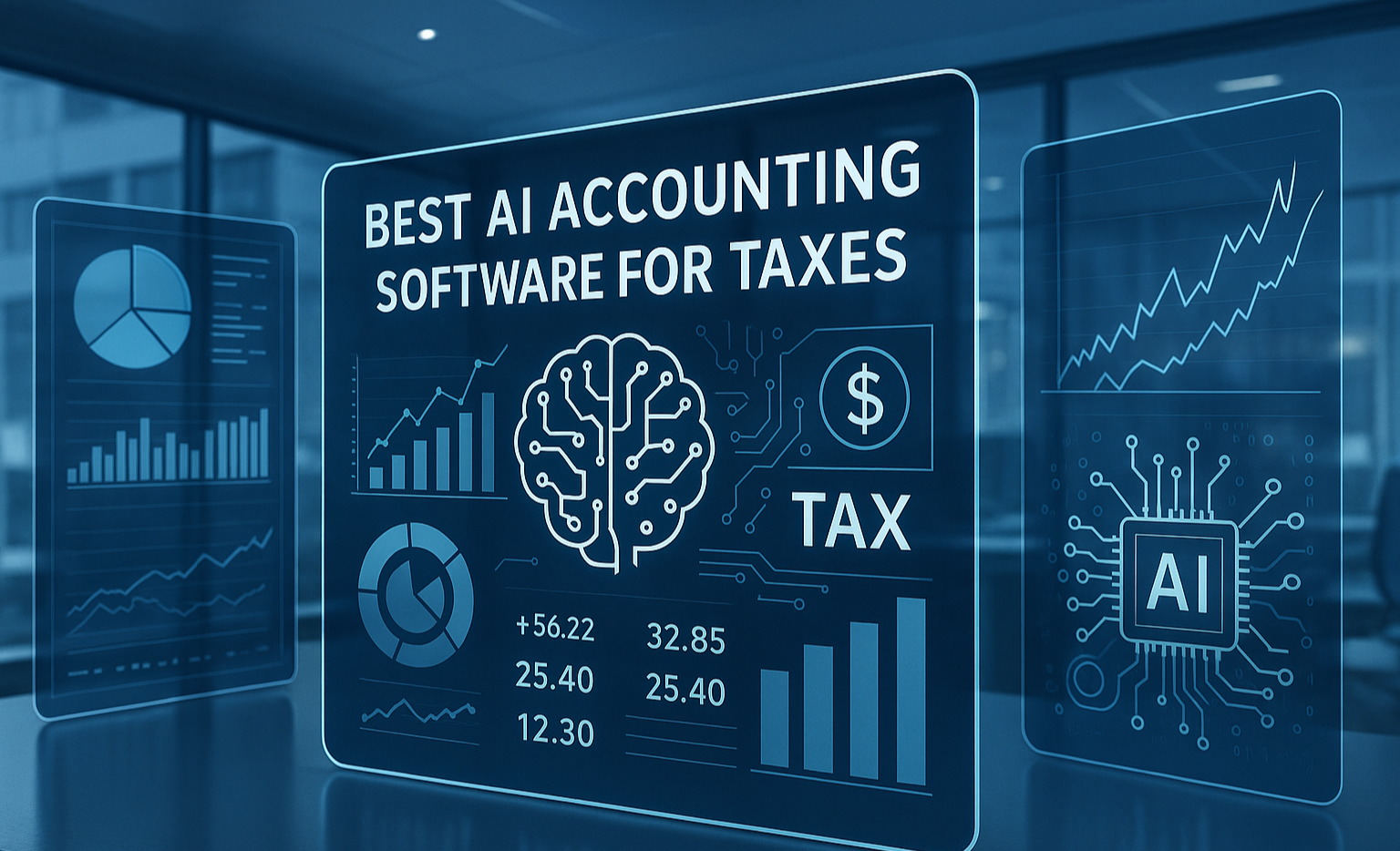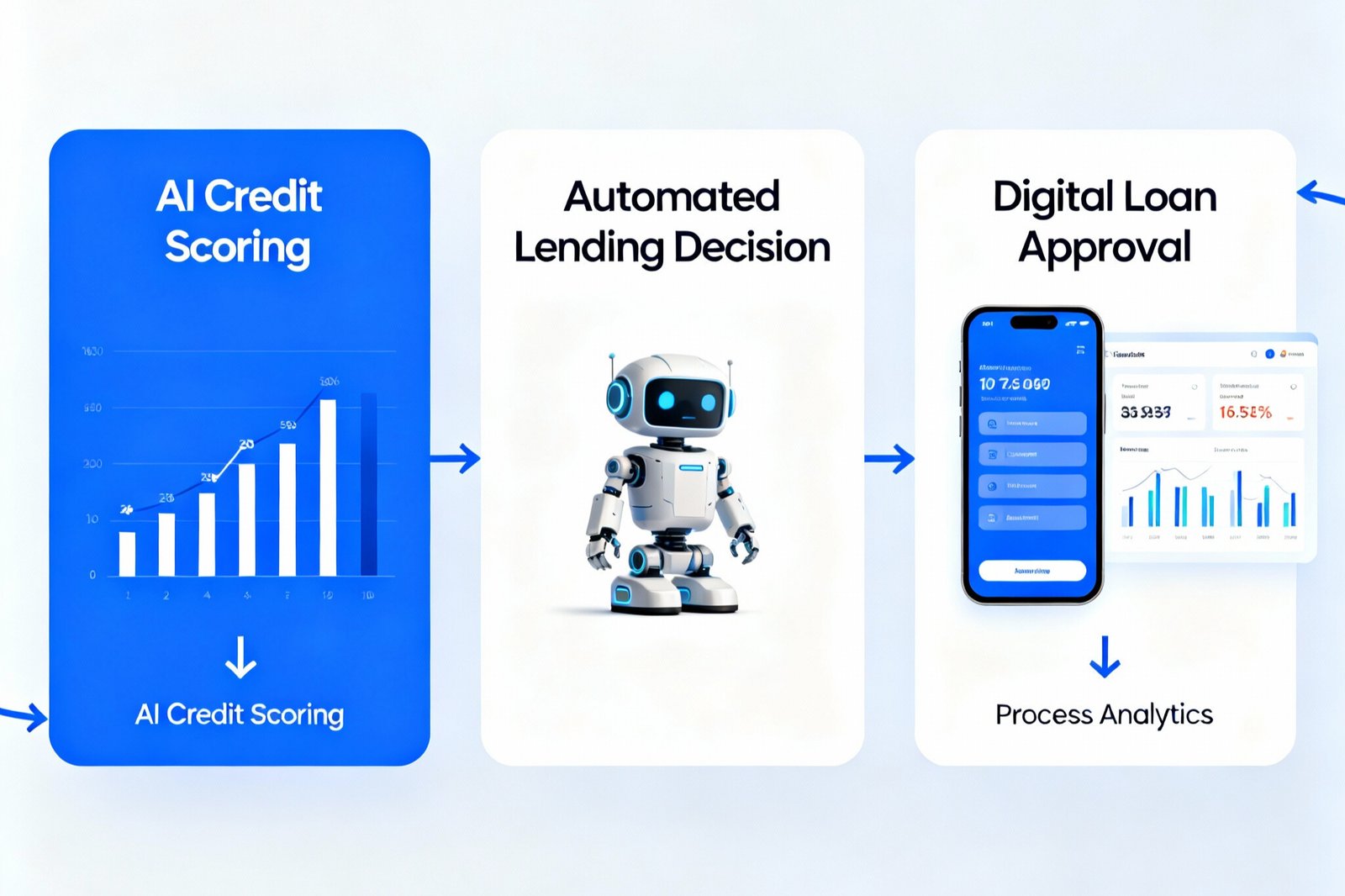Tax season doesn’t have to be a nightmare anymore. With artificial intelligence revolutionizing the accounting industry, what is the best AI accounting software for taxes has become one of the most searched questions among business owners and tax professionals. The right AI-powered tax software can transform hours of manual work into minutes of automated precision, helping you save time, reduce errors, and potentially save thousands in tax liabilities.
In this comprehensive guide, we’ll explore the top AI accounting software options specifically designed for tax preparation and compliance, helping you make an informed decision that could dramatically improve your tax management process.
What Is AI Accounting Software for Taxes?
AI accounting software for taxes combines traditional accounting capabilities with artificial intelligence to automate tax-related processes. These intelligent systems can automatically categorize expenses, identify potential deductions, calculate tax liabilities in real-time, and ensure compliance with ever-changing tax regulations.
Unlike traditional accounting software that requires manual data entry and categorization, AI-powered solutions learn from your financial patterns and make intelligent decisions about how to handle your tax data. This technology can reduce accounting tasks by up to 95%, saving businesses an average of 57 hours monthly.
How AI Transforms Tax Preparation
AI accounting software uses machine learning algorithms to:
-
Automatically categorize transactions based on patterns
-
Identify potential tax deductions you might miss
-
Flag unusual transactions that could trigger audits
-
Provide real-time tax liability estimates
-
Generate accurate financial reports for tax filing
Top AI Accounting Software for Taxes in 2025
QuickBooks Online with Intuit AI
Best Overall Choice for Small to Medium Businesses
QuickBooks Online remains the gold standard when it comes to AI accounting software for taxes. With Intuit’s AI integration, this platform offers sophisticated tax preparation capabilities that make it ideal for most businesses.
Key Features:
-
Intelligent expense tracking with automatic categorization
-
Direct integration with TurboTax for seamless tax filing
-
Real-time tax insights and deduction tracking
-
Automated tax budgeting throughout the year
-
Mobile receipt capture with AI-powered data extraction
Pricing: Starting at $30/month for Simple Start plan
Why It’s Great for Taxes: The software automatically tracks your income and expenses throughout the year, making tax season significantly easier. Its AI can identify potential deductions and provide estimates of your tax liability in real-time.
TaxDome
Best for Tax Professionals and CPA Firms
TaxDome is specifically designed for tax professionals who need to manage multiple clients efficiently. This AI-powered platform streamlines the entire tax preparation workflow.
Key Features:
-
AI-powered document sorting and organization
-
Automated client communication and task management
-
Secure client portal for document sharing
-
Integrated e-signature capabilities
-
Automated workflow management for tax seasons
Pricing: $66 per user per month
Why Tax Professionals Love It: TaxDome’s AI can automatically sort and categorize client documents, reducing preparation time by up to 70%. The platform also automates client communication, sending reminders and updates automatically.
Sage Intacct with AI Copilot
Best for Enterprise-Level Tax Compliance
For larger businesses with complex tax situations, Sage Intacct offers enterprise-grade capabilities with AI-powered insights.
Key Features:
-
AI-driven dashboard with real-time tax analytics
-
Multi-entity consolidation for complex tax reporting
-
Advanced compliance support for various tax jurisdictions
-
Automated balance sheet management
-
Integration with major tax software systems
Pricing: Custom pricing based on company size and needs
Enterprise Advantage: Sage Intacct’s AI can handle complex multi-entity tax situations, automatically consolidating data from different business units and providing comprehensive tax reporting.
Docyt AI
Best for Automated Tax Data Collection
Docyt AI specializes in automatically gathering and organizing financial data from various sources, making tax preparation effortless.
Key Features:
-
Automatic data collection from banks, POS systems, and accounting platforms
-
Real-time financial insights for tax planning
-
Mobile receipt tracking with AI recognition
-
Automated expense categorization
-
Predictive cash flow analysis for tax planning
Pricing: $299-$999 per month
Unique Selling Point: Docyt’s AI can automatically pull data from over 12,000 financial institutions, ensuring no transaction is missed during tax preparation.
Blue Dot
Best for Tax Compliance Automation
Blue Dot focuses specifically on tax compliance, using AI to ensure businesses meet all their tax obligations automatically.
Key Features:
-
Automated VAT calculations and reporting
-
Intelligent identification of eligible expenditures
-
Taxable employee benefits management
-
Integration with expense management systems
-
Real-time compliance monitoring
Pricing: Contact for custom pricing
Compliance Focus: Blue Dot’s AI continuously monitors your financial activities to ensure ongoing tax compliance, reducing the risk of penalties and audits.
Essential Features to Look for in AI Tax Software
When evaluating what is the best AI accounting software for taxes for your specific needs, consider these crucial features:
Automated Transaction Categorization
The software should intelligently categorize your income and expenses based on transaction patterns, reducing manual work by up to 90%.
Real-Time Tax Calculations
Look for software that provides ongoing tax liability estimates, helping you plan and budget for tax payments throughout the year.
Integration Capabilities
Your AI tax software should integrate with:
-
Banking institutions for automatic transaction import
-
Popular tax filing software like TurboTax or FreeTaxUSA
-
Payroll systems for employee tax calculations
-
E-commerce platforms for sales tax management
Audit Trail and Compliance
Ensure the software maintains detailed audit trails and helps with regulatory compliance across different tax jurisdictions.
Mobile Accessibility
Modern AI tax software should offer mobile apps with features like receipt scanning and expense tracking on the go.
Benefits of Using AI Accounting Software for Taxes
Time Savings
Businesses using AI accounting software report saving an average of 57 hours monthly on accounting tasks. During tax season, this translates to dramatically reduced preparation time.
Improved Accuracy
AI eliminates human errors in data entry and calculations. Studies show that AI-powered accounting software reduces errors by up to 85% compared to manual processes.
Cost Reduction
While AI software may have higher upfront costs, businesses typically see ROI within 3-6 months through reduced labor costs and better tax optimization.
Enhanced Deduction Discovery
AI can identify tax deductions that humans might miss, potentially saving thousands in tax liabilities. For example, the software might flag home office expenses, business meal deductions, or equipment depreciation opportunities.
Continuous Compliance Monitoring
Instead of scrambling during tax season, AI software monitors compliance year-round, alerting you to potential issues before they become problems.
How to Choose the Right AI Tax Software for Your Business
Assess Your Business Size and Complexity
-
Small businesses (1-10 employees): QuickBooks Online with AI features
-
Medium businesses (10-100 employees): Consider TaxDome or Docyt AI
-
Large enterprises (100+ employees): Sage Intacct or custom enterprise solutions
Consider Your Industry
Some industries have specific tax requirements. For example, retail businesses need robust sales tax management, while service businesses focus more on expense categorization and deduction optimization.
Evaluate Integration Needs
List all the systems you currently use (banking, payroll, e-commerce) and ensure your chosen AI tax software can integrate with them seamlessly.
Budget Considerations
While AI software typically costs more than basic accounting software, consider the long-term savings in time and potential tax optimization. Most businesses see positive ROI within the first year.
Implementation Best Practices
Start Early in the Tax Year
Don’t wait until tax season to implement AI software. Starting at the beginning of the tax year allows the AI to learn your patterns and provide better insights.
Clean Your Historical Data
Before importing data into AI software, clean up your existing financial records to ensure the AI learns from accurate information.
Train Your Team
Invest time in training your team on the new software. Most AI tax platforms offer comprehensive training resources and support.
Regular Review and Optimization
AI software improves over time, but regular review of categorizations and settings ensures optimal performance.
The Future of AI in Tax Accounting
The AI accounting software market is expected to grow at a compound annual growth rate of 35% through 2028. Future developments will likely include:
-
More sophisticated predictive analytics for tax planning
-
Enhanced natural language processing for document analysis
-
Improved integration with government tax systems
-
Advanced fraud detection capabilities
Conclusion
Determining what is the best AI accounting software for taxes depends on your specific business needs, size, and budget. For most small to medium businesses, QuickBooks Online with Intuit AI offers the best balance of features, ease of use, and tax-specific capabilities. Tax professionals should consider TaxDome for its client management features, while larger enterprises may benefit from Sage Intacct’s comprehensive capabilities.
The key is to choose software that not only handles your current tax needs but can scale with your business growth. With AI-powered tax software, you’re not just preparing for this year’s taxes – you’re investing in a system that will make every future tax season more efficient and accurate.
Remember, the best AI accounting software for taxes is the one that integrates seamlessly with your existing workflow while providing the automation and insights you need to optimize your tax strategy year-round.
FAQs
Q1: What makes AI accounting software better for taxes than traditional software?
AI accounting software automatically categorizes transactions, identifies potential deductions, provides real-time tax calculations, and learns from your financial patterns. This reduces manual work by up to 95% and minimizes errors that are common with traditional software.
Q2: How much can I save using AI tax accounting software?
Businesses typically save 57 hours monthly on accounting tasks and see ROI within 3-6 months through reduced labor costs and better tax optimization. The software can also identify missed deductions, potentially saving thousands in tax liabilities.
Q3: Is AI tax software secure for sensitive financial data?
Yes, reputable AI tax software providers use bank-level encryption, multi-factor authentication, and comply with industry standards like SOC 2 Type II. They also maintain detailed audit trails for compliance purposes.
Q4: Can AI tax software handle complex business structures?
Advanced AI platforms like Sage Intacct can handle multi-entity businesses, international tax compliance, and complex reporting requirements. However, simpler solutions like QuickBooks Online are better suited for straightforward business structures.
Q5: How long does it take to implement AI tax accounting software?
Implementation typically takes 2-4 weeks, depending on the complexity of your business and data migration needs. Most providers offer onboarding support and training to ensure smooth transitions.
Q6:Do I still need an accountant if I use AI tax software?
While AI software can handle routine tasks and calculations, complex tax situations, strategic tax planning, and compliance issues may still require professional expertise. Many businesses use AI software to handle day-to-day tasks while consulting accountants for strategic decisions.








Leave a Reply